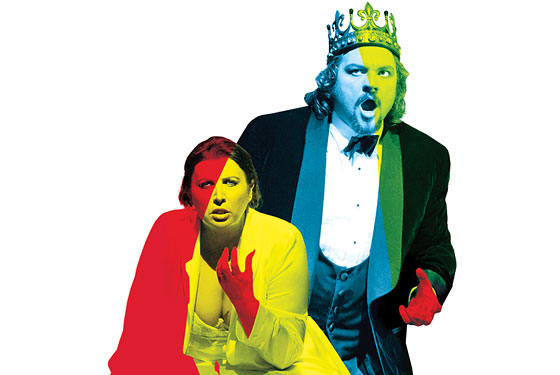
In an ideal cosmos, opera would always merge theatrical dazzle with vocal majesty. In this world, the two are often at odds. Hoping for a more perfect union, the Met brought in the veteran Shakespearian Adrian Noble to direct Verdi’s long-absent Macbeth and hired soprano Maria Guleghina to sing it. The result is an ungainly lady picking her way atop a path of chairs positioned like stepping-stones, trying to sing without falling off. Or dutifully rolling down the raked stage and then springing to her feet as if to ask, Was that right? The rage and desperation, they were okay? It’s hard to know whether Noble directed her this way out of frustration or vindictiveness—whether he had to find some way, however preposterous, for a wooden Guleghina to signal her character’s torment, or whether he simply wanted to keep the damn diva busy while he focused on more malleable members of the cast.
Noble tries to make his dark, virtually black-and-white production simultaneously intimate and epic. The first impulse is Shakespearian, the second draws from Verdi. The play scrutinizes the Macbeth couple’s consciences, the stain of guilt and the soul-warping consequences of ruthless ambition. Verdi, more interested in populations than in individual people, focused on the iniquities of tyranny. And so the operatic Macbeth abridges his nihilistic monologue about “a tale told by an idiot” to leave time for choruses of groaning Scots—stand-ins for Europe’s bourgeois liberals, whom Verdi was trying to incite. Noble, with murkier political intentions, sets the tale of medieval skulduggery in some nameless twentieth-century civil war, where black-clad warlords with automatic weapons range across a blasted landscape.
The director would clearly have liked to use the extended scenes between Macbeth and his spouse to explore the psychology of crime. He got some help from the fine baritone Željko Lucic, who played Macbeth as a functionary-turned-potentate. Charmless, plodding, and not obviously cruel, he seemed comfortable in the rumpled outfit of a minor thane. As Guleghina’s Lady Macbeth gave voice to his violent fantasies, his mettle hardened and his voice grew stronger. The end of the arc, in which the murderous monarch bellows madly at his fate, never fully materialized, however, either because Noble got distracted by apocalyptic battle or because Lucic couldn’t bring himself to tear his hard-won character apart.
Vocally, Guleghina had an uneven opening night, starting with nervous shrilling and ending in fatigue, but she offered some golden clearings in between. When she could concentrate on singing, her great piston of a voice churned unstoppably and her sanguinary henpecking became a tragic force. But mostly she seemed lost in a production that tried so hard to be trenchant and grim that it sometimes became distractingly funny: when Guleghina fussed with her nightgown to prevent herself from spilling out; when she hoisted a goblet as big as the Davis Cup; when she waved her blood-drenched hands like a ghoul in a Halloween parade.
Noble proves defter at maneuvering crowds of refugees, militias, and banqueters, which he does with the panache of a Hollywood man. The show’s most vivid characters are a conclave of witches out of Roald Dahl, sinister biddies in saggy cardigans and print dresses, savagely brandishing handbags. Set designer Mark Thompson helps supply theatrical wizardry in the form of prophesying spirits that appear as projections in a vaporous ball.
With its roiling, polychrome orchestration and inexorable momentum, Macbeth is practically a symphony with voices. James Levine draws out of the pit a deep, damask orchestral sound and, thanks to the ministries of chorus director Donald Palumbo, the assorted mobs sing in stirring unanimity. While the principal characters strut and fret, these massed musicians thunder toward the opera’s fearsome end. Yet there is one episode of solo sweetness before the final battle, offered up by the tenor Dimitri Pittas, as sensitive a Macduff as you’re likely to hear. The soldier is sitting on a Jeep, like a G.I. out of a Ken Burns documentary, when he receives the news that Macbeth has killed his wife and children. Pittas responds not with a vengeful howl but in tender tones that make the evening shudder with a spasm of plain sincerity.
Macbeth
By Giuseppe Verdi. The Metropolitan Opera. Through May 17.
